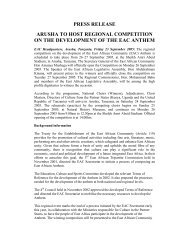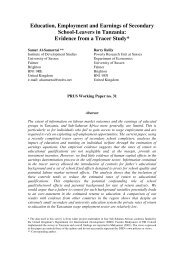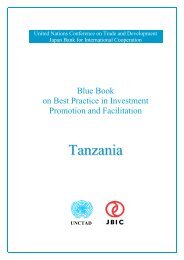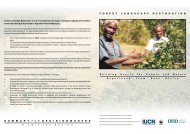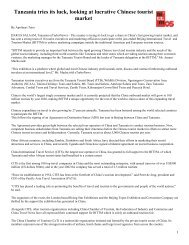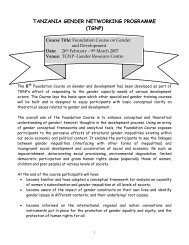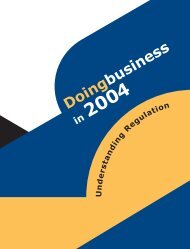Financial sector development - Sida
Financial sector development - Sida
Financial sector development - Sida
You also want an ePaper? Increase the reach of your titles
YUMPU automatically turns print PDFs into web optimized ePapers that Google loves.
The majority of African countries are keenly interested in receiving FDI and other private<br />
capital inflows, which is in sharp contrast to the situation in the 1960s and 1970s when<br />
most governments were hostile towards foreign companies. Most countries in the region<br />
have recently improved their regulatory frameworks relating to FDI, and provided various<br />
incentives aiming to attract FDI, or are in the process of doing so. However, this have not<br />
yet led to any substantial volume of FDI inflows. Of course, the response by investors to<br />
deregulation and incentives takes time, and may not yet have materialised.<br />
There are however, a number of crucial conditions for FDI are still lacking in the region. In<br />
several aspects Africa as a whole does not compare favourably to foreign investors.<br />
These include; (i) political instability, (ii) debt overhang and shortage of foreign exchange,<br />
(iii) inadequate institutions, legislation and financial systems, (iv) low levels of education<br />
and skills, (v) small domestic markets, (vi) poor infrastructure and (vii) low reliance on<br />
privatisation and debt equity swaps to attract FDI. In order to attract more FDI and other<br />
private flows, these conditions must be improved. Deregulation and incentives with<br />
respect to FDI will have a limited impact if other basic conditions are lacking.<br />
Box 7. Pension fund investment from aging to emerging markets<br />
The rapid aging of populations in the rich economies can be expected to stimulate strong growth in private<br />
funded pensions, providing a massive potential of foreign finance for developing countries. Pension managers<br />
can reap big diversification benefits by investing on the emerging stock markets of the younger economies,<br />
benefits which are largely unexploited so far. The authorities in OECD countries should consider removing<br />
regulatory constraints imposed on pension assets that deprive retirees from pension -improving benefits of<br />
global diversification. Policy makers in developing countries should design policies that reassure institutional<br />
investors on default risk and stock market illiquidity, if they want to tap a higher share of OECD pension<br />
assets. At the end of 1992 funded pensions in the OECD area alone had assets of almost USD 6 000 billion.<br />
In view of demographic trends and the shift from traditional state pensions to funded private schemes OECD<br />
pension funds are expected to manage a total of USD 13 000 billion by year 2000. About 3 per cent , i.e.<br />
USD 350 billion, of these assets are believed to be invested in emerging stock markets. In the decade up to<br />
year 2010 an additional USD 40-60 billion will be invested annually in these markets. (OECD Development<br />
Centre Policy Brief )<br />
The following four broad areas of involvement by <strong>Sida</strong> are recommended:<br />
First, of highest priority is to aim at macro-economic stability including a sustainable<br />
external debt situation, to improve the business climate, increase privatisation, to<br />
establish efficient financial systems, to reduce bottlenecks relating to infrastructure, and<br />
to increase training. All these efforts can be pursued at a rather detailed level, i.e.<br />
removing specific bottlenecks relating specifically to a potential FDI inflow.<br />
Second, also of high priority, is to assist programme countries to take advantage of the<br />
linkages to South Africa, and possibly other more advanced African countries, as regional<br />
growth poles in their efforts to increase capital inflows. Hence, it should be important to<br />
promote regional integration.<br />
Third, promotion of Swedish enterprises to invest in program countries. This area may be<br />
explored in the future when business conditions in host countries are improved. In this<br />
respect, it should be highlighted that Swedish private investments in Sub-Saharan Africa<br />
47



